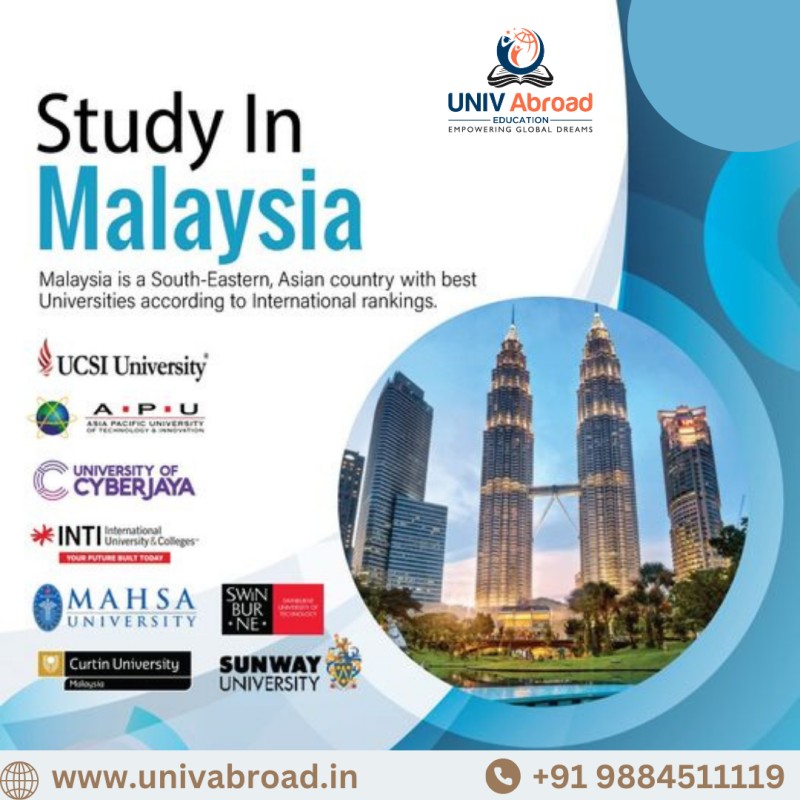
WHY STUDY IN MALAYSIA from India?

Study in MALAYSIA ?
The system and structure of tertiary education in Malaysia is run by the country’s Ministry of Higher education. Students who choose to study in Malaysia for higher education can take the certificate, diploma, undergraduate or postgraduate course. There are 6 Malaysian universities in the 2019 QS World University ranking under the top 500. The highest ranked of these is Universiti Malaya (UM) which comes in at 87th place. Universities in Malaysia can offer high-quality education alongside a unique experience to each and every student who chooses to study here.
International students are not permitted to work during term-time, but they will need to prove that they have sufficient funds to be able to enter Malaysia.
Cost of Studying in Malaysia
Modeled on the British education system, education in Malaysia is much cheaper than education in the UK. Living and education costs are affordable but yield the same result and recognition in the world.
There are ample of scholarships available to students provided by the Malaysian universities that would help students in their funding.
The process
Study in Malaysia bears practices like entrance tests, contacting universities, understanding their terms and conditions, eligibility criteria, admission procedures, scholarships, Malaysian study visa requirements, accommodation and many other things involved in the process.

Why Study In MALAYSIA?
Top Most Reasons Why You Choose To Study In The MALAYSIA?
While individual preferences vary, here are some common reasons why students choose to study in Malaysia:
1. Quality Education: Malaysia has several reputable universities and colleges that offer high-quality education. Some institutions are ranked globally, providing a diverse range of academic programs.
2. Cost of Living: Compared to many Western countries, the cost of living in Malaysia is relatively lower. This includes accommodation, transportation, and daily expenses, making it an attractive option for students on a budget.
3. Diverse Culture: Malaysia is known for its cultural diversity, with a harmonious blend of Malay, Chinese, Indian, and indigenous cultures. Studying in such a multicultural environment can provide students with a unique and enriching experience.
4. English as a Medium of Instruction: Many courses in Malaysia are offered in English, making it easier for international students, especially those who are proficient in English, to pursue their education without language barriers.
5. Warm Climate: Malaysia enjoys a tropical climate with warm temperatures throughout the year. For students who prefer a climate that is generally consistent and warm, Malaysia can be an appealing destination.
6. Beautiful Landscape: Malaysia boasts a diverse and beautiful landscape, including tropical rainforests, pristine beaches, and modern urban areas. This offers students the opportunity to explore and experience various natural wonders.
7. Affordable Tuition Fees: While tuition fees vary across institutions and programs, many courses in Malaysia are more affordable compared to those in Western countries. There are also scholarship opportunities available for eligible students.
8. Ease of Travel: Malaysia is strategically located in Southeast Asia, providing easy access to neighboring countries. This makes it convenient for students to explore other parts of Asia during breaks or holidays.
9. Modern Infrastructure: Malaysia has modern infrastructure and facilities, particularly in urban areas. This includes well-equipped campuses, advanced technology, and efficient public transportation systems.
10. Hospitality and Friendliness: Malaysians are known for their hospitality and friendliness. The welcoming culture of the country can make international students feel at home and create a supportive environment for their studies.
It's essential for prospective students to thoroughly research and consider their personal preferences, academic goals, and career aspirations when choosing a study destination.
Top 10 Universities for Foreign Study in Malaysia are
Malaysia has several reputable universities that attract international students. Please note that rankings may change, and it's advisable to check the latest information. Here are ten universities in Malaysia known for hosting foreign students:
Always check the latest rankings, reviews, and specific program offerings when considering universities for foreign study. Additionally, consider your field of study, budget, and personal preferences when making a decision.
Eligibility criteria for studies in Malaysia
Eligibility criteria for studies in Malaysia can vary depending on the level of education (e.g., undergraduate, postgraduate) and the specific university or college you are applying to. However, I can provide you with some general guidelines that are often applicable:
1. Language Proficiency:
• For international students, a good command of English is usually required. This can be demonstrated through tests such as the IELTS or TOEFL.
2. Academic Qualifications:
• For undergraduate programs, you typically need to have completed secondary education or its equivalent.
• For postgraduate programs, you usually need to have a relevant undergraduate degree or equivalent qualification.
3. Specific Program Requirements:
• Some programs may have additional requirements, such as specific subjects studied at the previous level or work experience in a related field.
4. Visa Requirements:
• International students usually need a student visa to study in Malaysia. Visa requirements may vary, but generally, you need an acceptance letter from a recognized institution in Malaysia.
5. Health Insurance:
• Some universities may require you to have health insurance coverage for the duration of your studies.
6. Financial Proof:
• You may need to provide evidence of your ability to financially support yourself during your studies. This could include bank statements or sponsorship letters.
7. Application Forms and Fees:
• Complete the application forms provided by the institution you are applying to. There may be application fees involved.
8. Entrance Exams:
• Some programs may require you to take specific entrance exams.
9. Interviews:
• Depending on the program or university, you may be required to attend an interview as part of the application process.
10. Recognition of Qualifications:
• Ensure that your previous qualifications are recognized by the Malaysian Qualifications Agency (MQA) or the relevant accrediting body.
It's essential to check the specific admission requirements of the institution and program you are interested in, as these can vary. Contact the admissions office of the university or college directly, or visit their official website for the most accurate and up-to-date information.
